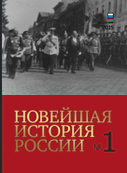Западный фронт Российской империи в воспоминаниях французских участников Первой мировой войны
Memoirs Concerning the Russian Empire and its Western Front Among French Participants of World War I
Author(s): L. V. Slutskaya , O. S. DanilovaSubject(s): History
Published by: Издательство Исторического факультета СПбГУ
Keywords: memoires; imagology; “image of other”; The World War I; The Russian Empire’s Western front; French military mission; the Supreme Headquarter; Jules Legras; Pierre Pascal
Summary/Abstract: The article analyzes the memoirs and diaries of members of the French military mission — Jules Legras and Pierre Pascal — and provides information about the Russian Empire’s Western front and about military action on the territory of modern Belarus during the first years of the World War I. This front was not only one of the most important theaters of the war, but it also defended the strategic Smolensk-Moscow line. The front continued to exist even in the period of revolutionary upheaval, and the affairs that took place there were of the highest importance and exerted the greatest influence over the historical destinies of the countries involved in this conflict. One of the most important sources on this subject are the diaries and memoirs of the French officers who served with their country’s military mission in Russia during World War I. It was not for the first time and not just by chance that these writers appeared in Russia. J. Legras was a specialist in German studies and taught Russian on the university level; he had traveling all over Russia already in the 19th century. Legras was the author of popular books about the situation in Russia and this explains why he was sent as a propagandist to the front lines of the empire. His aim was to testify to France’s military potential among the Russians and assure them about the depth of French support. His memoirs describe the war and military action in detail. They are full of his thoughts about the structure of Russian Army and the positive and negative characteristics of the Russian soldier. Legras compared these subjects to their German analogs, as he was the author of work on the structure and peculiarities of the German Army and its intelligence operations. P. Pascal was much younger than Legras and a university graduate. After being wounded twice, he found himself deep in the Russian rear, occupied with propaganda, despite the fact that he would have preferred to return to combat. As Pascal had already visited Russia several times at the beginning of 20th century and spoke Russian fluently, he was sent to Russia as a member of French military mission. Unlike Legras, Pascal spent time in his memoirs not only analyzing current events, but also pondering the intricacies of the Russian soul, attempting to understand a country he loved and the Russian people who were suffering in this war. His “Russian Memoirs” are a kind of literary monument to Russia, a country that was deeply convulsed by war and revolution; they are an invaluable source for the intellectual history of that epoch. The personal documents of both writers reveal new facets of seemingly well-known events and personalities. The memoirs of Legras and Pascal are an invaluable source because they reflect the attitude of French officers from inside the Russian Empire’s military affairs. These memoirs contain not only detailed and unique descriptions of the Russian Empire
Journal: Новейшая история России
- Issue Year: 5/2015
- Issue No: 12
- Page Range: 16-28
- Page Count: 13
- Language: Russian

